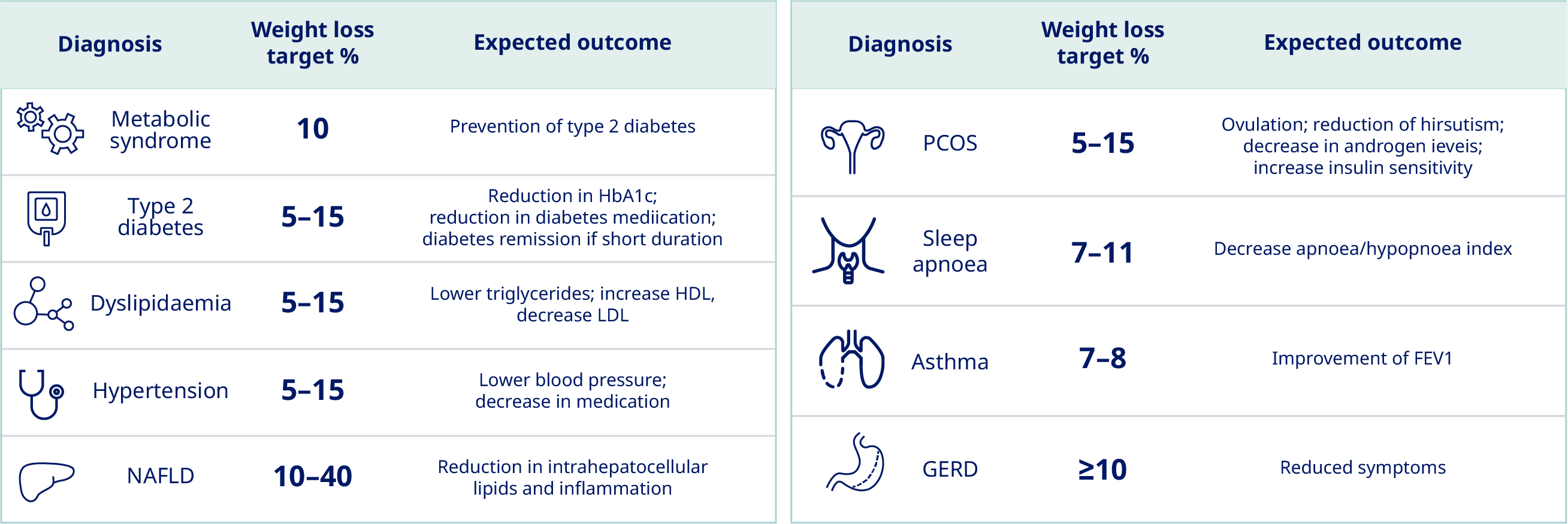
What to expect:

When it comes to managing your patients with obesity, it's important to communicate that weight loss can significantly reduce the risk of developing obesity related complications.
Some complications are more sensitive to weight loss than others and a weight loss of as little as 5% has been seen to have significant and long-standing health benefits. However, with increasing weight loss, the benefits in improving complications increase, and additional improvements are seen with a weight loss of 10–15%, or more.1-13
Below is an overview showing how much weight loss and maintenance of weight loss is needed to improve some of the most prevalent weight-related complications.5,14
1. Knowler WC, Barrett-Connor E, Fowler SE, et al. Reduction in the incidence of type 2 diabetes with lifestyle intervention or metformin. N Engl J Med. 2002;346:393–403.
2. Wing RR, Lang W, Wadden TA, et al. Benefits of modest weight loss in improving cardiovascular risk factors in overweight and obese individuals with type 2 diabetes. Diabetes Care. 2011;34:1481–1486.
3. Dattilo AM and Kris-Etherton PM. Effects of weight reduction on blood lipids and lipoproteins: a meta-analysis. Am J Clin Nutr. 1992;56:320–328.
4. Coggon D, Reading I, Croft P, et al. Knee osteoarthritis and obesity. Int J Obes Relat Metab Disord. 2001;25:622–627.
5. Christensen R, Bartels EM, Astrup A, et al. Effect of weight reduction in obese patients diagnosed with knee osteoarthritis: a systematic review and meta-analysis. Ann Rheum Dis. 2007;66:433–439.
6. Zelber-Sagi S, Godos J and Salomone F. Lifestyle changes for the treatment of nonalcoholic fatty liver disease: a review of observational studies and intervention trials. Therap Adv Gastroenterol. 2016;9:392–407.
7. Glass LM, Dickson RC, Anderson JC, et al. Total body weight loss of >/= 10 % is associated with improved hepatic fibrosis in patients with nonalcoholic steatohepatitis. Dig Dis Sci. 2015;60:1024–1030.
8. Garvey W, Mechanick J, Brett E, et al. American Association of Clinical Endocrinologists and American College of Endocrinology comprehensive clinical practice guidelines for medical care of patients with obesity. Endocr Pract. 2016; 22(Suppl 3):1–203.
9. Lean M, Leslie W, Barnes A, et al. Primary care-led weight management for remission of type 2 diabetes (DiRECT): an open-label, cluster-randomised trial. Lancet. 2018; 391:541–551.
10. Benraoune F and Litwin S. Reductions in cardiovascular risk
after bariatric surgery.
Curr Opin Cardiol. 2011; 26:555–561.
11. Sundström J, Bruze G, Ottosson J, et al. Weight loss and heart failure: A national study of gastric bypass surgery versus intensive lifestyle treatment. Circulation. 2017; 135:1577–1585.
12. Look AHEAD Research Group. Lancet Diabetes Endocrinol. 2016; 4:913–921.
13. Ryan D and Yockey S. Weight loss and improvement in comorbidity: Differences at 5%, 10%, 15%, and over. Curr Obes Rep. 2017; 6:187–194.
14. Schutz D, Busetto L, Dicker D, et al. European Practical and Patient-Centred Guidelines for Adult Obesity Management in Primary Care. Obes Facts. 2019;12:40–66.
HQ21OB00061, Approval date: April 2021
The site you are entering is not the property of, nor managed by, Novo Nordisk. Novo Nordisk assumes no responsibility for the content of sites not managed by Novo Nordisk. Furthermore, Novo Nordisk is not responsible for, nor does it have control over, the privacy policies of these sites.
At Novo Nordisk we want to provide Healthcare Professionals (HCPs) with scientific information, resources and tools.
